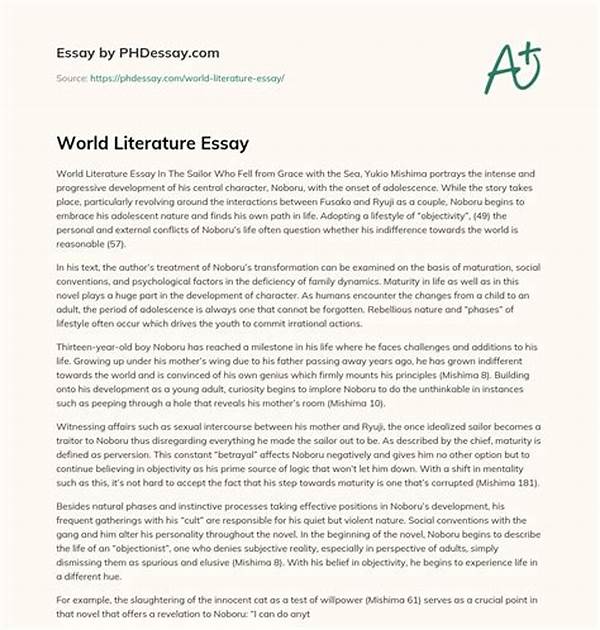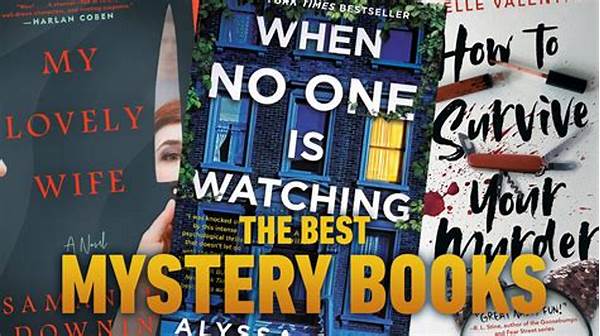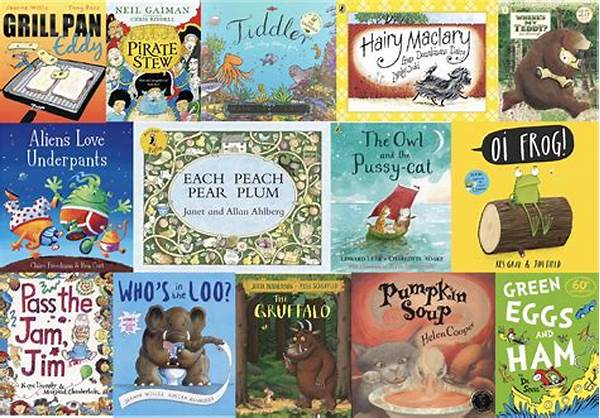Once upon a time, in a world where words spun magic, literature and essays were the keys to understanding humanity’s grand narrative. Through pages, we journeyed across cultures, time, and emotions. Our companions on this literary odyssey? Celebrated global literature and essays that broke the confines of time and geography, speaking universal truths while wrapped in the skin of specific experiences. Each story, an invitation. Each essay, a mirror. Let us embark on a journey to explore this vibrant world.
Read Now : Christmas Collectible Gifts For Friends
The Vibrant World of Celebrated Global Literature and Essays
In our bookish adventures, celebrated global literature and essays are like that vintage vinyl everyone raves about. They’re the real deal. You’ve got giants like Gabriel García Márquez weaving magical realism, where the impossible dances like it ain’t no big deal. Mishima’s tales turn the mundane into epic reflections on life, making you ponder even your morning toast.
Then there’s Zadie Smith, with her exquisite blend of wisdom and wit. Her words wrap around you, nudging you to ask the big questions. It’s like the literature equivalent of having a soul-baring chat with a wise old friend over a warm cuppa. And let’s not forget James Baldwin’s essays, which hit you right where it matters, forcing you to face harsh realities with a raw honesty few can manage. These pieces of celebrated global literature and essays aren’t just stories; they’re complete vibe checks on how we jive with the world around us.
Every page you flip through is a step into an author’s mind, across borders, relentlessly probing human emotions and experiences. And let’s be real, it’s like receiving a cultural education without the boring lectures. So why settle for ordinary when celebrated global literature and essays offer you the whole wide world wrapped in ink and imagination?
Breaking Down the Celebrated Global Literature and Essays
1. James Baldwin, the OG, serves gritty truth with no sugar-coating. His essays shake you to your core.
2. Márquez blends reality with fantasy seamlessly in his celebrated global literature and essays. Straight-up magical.
3. Mishima doles out drama like your favorite soap, but with a philosophical twist.
4. Zadie Smith? She makes you question societal norms with her witty observations.
5. Jhumpa Lahiri, with her tales of cultural displacement, hits close to home for anyone feeling like an outsider.
The Unspoken Charm of Celebrated Global Literature and Essays
Slang writing is the cool cousin at the literary family reunion. It’s relatable, chill, and gets right to the heart of things without being all uptight. Celebrated global literature and essays have their posh moments, sure, but there’s beauty in raw, colloquial expressions too. They communicate the essence of a culture in a way that’s not constrained by traditional norms.
Take Twain, for example. His dialogues bring a time and place to life, letting readers feel the pulse of the era. In celebrated global literature and essays, slang creates texture, flavor, adding an authentic voice that more formal writing sometimes misses. It’s all about bringing the reader in close, making the narrative not just a story, but a shared experience.
Slang in writing is like inviting a reader to a casual hangout rather than a formal event. It’s laid-back, engaging, and built on the common ground. Celebrated global literature and essays utilize this approach, sometimes subtly, sometimes overtly, to break barriers between the narrative and its audience. It’s literature that doesn’t stand on ceremony, and that’s what makes it so compelling.
Celebrated Global Literature and Essays: Slang Style in Focus
1. Slang is your mate that cuts through pretentiousness.
2. It gives voice to characters, making them sound like real peeps.
3. Slang is playful, poking the reader to feel, react, engage.
4. It’s the bridge for connecting colloquially with the audience.
5. Brings cultural flavor into celebrated global literature and essays.
Read Now : Cognitive Aspects Of Word Recognition
6. Creates authenticity, making narratives believable and relatable.
7. Adds humor or gravitas naturally, without forced storytelling.
8. Makes literary works accessible, even to casual readers.
9. Refreshes classic narratives with modern vibes.
10. Engages younger audiences through relatable language.
Deep Dive into Celebrated Global Literature and Essays
The charm of celebrated global literature and essays lies in their ability to communicate deep, universal truths with ease. When you think of classic literary figures like Mark Twain, it’s evident how integral slang style is in giving characters their authentic, relatable voices. It’s akin to hearing that song that perfectly captures your mood—familiar and electrifying all at once.
This casual linguistic approach, often found in celebrated global literature and essays, helps demystify the layers of pretense often associated with literary works. It gives power and agency to colloquial speech, making the narratives not only approachable but also profoundly impactful. Slang isn’t just a decorative device; it’s the heartbeat of a living narrative, infusing stories with life and vigor.
In exploring celebrated global literature and essays, embracing the slang style is about recognizing the power of the language that speaks to the everyday person. It’s about finding that common ground where high literature and daily speech meet, creating dialogues that transcend pages, echoing through real-life conversations.
The Art of Slang in Celebrated Global Literature and Essays
In the realm of celebrated global literature and essays, slang acts as a cultural time capsule, capturing the zeitgeist of an era, a region, or a community. It serves as a bridge between the narrative’s universe and ours, making every plot twist and character quirk resonate with readers on a personal level. Employing slang isn’t just about playing it cool; it’s an avenue for authenticity.
These celebrated global literature and essays use slang as a linguistic mirror, reflecting societal norms and aberrations. As we navigate through colorful dialogues and straightforward prose, we’re given a glimpse into the everyday lives and challenges faced by people, transcending barriers of language and geography. This style invites readers into an honest conversation, making the narrative’s voice a part of the global chatter.
By integrating slang into celebrated global literature and essays, authors ensure that their work speaks to a diverse audience, breaking free from the confines of dated rhetoric. It’s playful, it’s poignant, and it packs a punch. It’s a stylistic choice that turns the mundane into meaningful and the trivial into treasured expressions of human experience.
Celebrated Global Literature and Essays: A Linguistic Fusion
Summing up the beauty of slang in celebrated global literature and essays, it’s clear there’s an undeniable charm in its relaxed authenticity. This stylistic choice refuses to stand on pretense, breaking the formal barriers and inviting readers to experience stories as they might hear them over a casual chat. Slang bridges the gap between diverse cultures and readers, ensuring literature remains that colorful, unabashed splash of life.
In a world where celebrated global literature and essays are celebrated, slang is the thread that stitches together the vibrant tapestry of human experience. Whether it’s through the gritty realism of Baldwin or the whimsical wonders of Márquez, slang provides a textured, nuanced touch to narratives. It enriches storytelling, enabling authors to reach the hearts of their readers with language that resonates on a personal level. From classic masters to contemporary voices, the inclusion of slang enhances the rhythm, making stories leap off the page, relatable and real.




